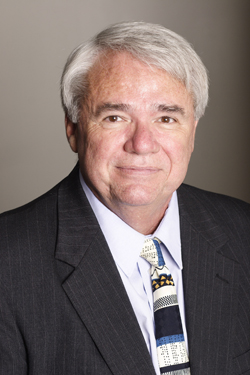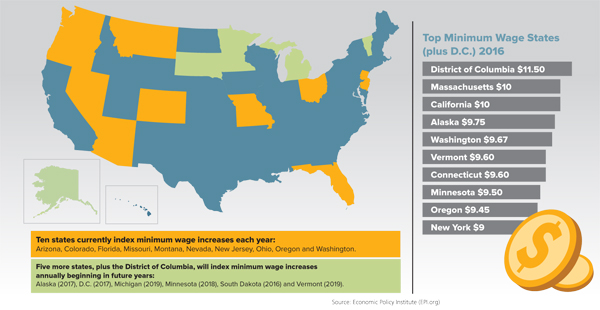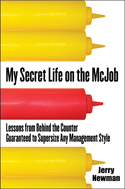
Newman
Minimum Wage—a Question of Fairness
By Jacqueline Molik Ghosen
"Mom, it's not fair! Everyone else gets to stay out past 11 o'clock."
How many times do you remember using this argument as a child, or hearing it as an adult? The argument is about fairness. In fact, if you think about the last time you were angry or frustrated, chances are it was probably related to your notion of fairness.
According to Jerry Newman, SUNY Distinguished Teaching Professor Emeritus in the School of Management, the whole minimum wage issue is about fairness. The problem is that everybody has a different definition of what is fair.
Newman, who is co-author of Compensation, the leading book on that topic for the past 30 years, lays out a number of scenarios:
A minimum wage worker says, "It's not fair that I work so hard and make only $9 an hour. Look at all these other people, especially these CEOs making $20 million. What they do isn't worth that much more than what I do."
Another employee points to his fellow worker and says, "Why is he getting more money? I've worked here longer than he has."
Or maybe he says, "I work a lot harder than him. It's not fair that he gets paid more than me."
Then there's the worker at the local bank who has an undergraduate degree and earns $25,000 a year. She says, "Look at these fast food workers who are asking for $15 an hour. Pretty soon they'll be making more than me. That's not fair."
And what about the entrepreneur who says, "I've risked everything to start this business. I've worked 18 hours a day for five years. Now I'm finally starting to make some money and these workers who've never risked anything are asking for wages that are so high I am going to go broke. That's just not fair."
"So what you've got is a whole bunch of people asking the same question but using a different lens to look at the issue of fairness," Newman says. "That's why there are so many heated arguments about minimum wage. All of them are right, but they all can't win."
You can make the argument that anyone making minimum wage ought to make a living wage, according to Newman. "That's not unreasonable," he says. "It's pushing for $15 very rapidly that causes companies a great deal of angst. Going from the current minimum to $15 is more than a 50 percent raise. Even if it's over several years like New York State is planning, that's a huge increase."
How do employers cope with such a large increase? After all, they're looking for fairness too. Newman says there are four ways to deal with a minimum wage increase: raise prices, accept a lower profit margin, improve technology (for example, restaurants could use kiosk ordering to replace some paid workers), and increase productivity (by working faster, smarter or harder).

Newman says what we need is a rational minimum wage plan. "If we had just raised the minimum wage at the rate the consumer price index was rising starting in the late 1960s when it was in the range of $4 an hour, it would now be $10.75 an hour. That's not unreasonable, and there would be far fewer complaints from workers if they were getting regular increases," he says. But everything else is increasing and minimum wages aren't.
The central problem is that the people fighting for an increase don't use an argument based on any of the usual factors that determine wages, Newman says. "For example, is $15 dollars an hour a market-driven rate?" he asks. "Probably not, because there are always plenty of applicants for these jobs," he says.
Other factors that differentiate wages—education or the amount of knowledge or ability a job takes—are also not factors because, for the most part, these jobs are not incredibly hard, according to Newman. As an aside, Newman adds that these jobs are stressful. "In fact," he says, "if they want to make an argument based on the factors that determine wages, they should say, 'Try coming in and working the lunch rush sometime, and believe me, you'll say $15 isn't at all unreasonable.'"
The heart of the problem, Newman asserts, is a constant collision between these market forces and control policies legislated by some level of government that call for wages higher than the market wage. The tension between these forces and legislated control policies drives this entire debate—and makes finding a solution that will appease everyone highly unlikely.
"Like the old adage, 'You can't fool Mother Nature,'" Newman says, "You can't fool Mother Market. It's inevitable that we are going to have minimum wage increases, but it's also inevitable that we are going to have employment impact." He says there will be layoffs and reduced hours.
"In the long run, everything will work out, but the long run is only great for historians and economists," he says. "Workers and employers live in the short run. And it will be painful for one or both parties as control policies duel with Mother Market to determine how the workforce evolves."


In addition to his other eminent qualifications, Jerry Newman brings personal experience to the discussion of minimum wage. He is author of My Secret Life on the McJob: Lessons from Behind the Counter Guaranteed to Supersize Any Management Style, in which he chronicles his experiences working undercover in seven fast food restaurants.
